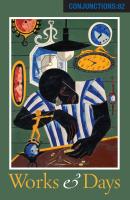![[A Reading by Carole Maso]](http://www.conjunctions.com/images/event_image.php?id=137011) On Monday, March 2, at 2:30 p.m., in Weis Cinema, Carole Maso reads from her work. Presented by the Innovative Contemporary Fiction Reading Series, and introduced by Bard literature professor and novelist Bradford Morrow, the reading is free and open to the public; no tickets or reservations are required.
On Monday, March 2, at 2:30 p.m., in Weis Cinema, Carole Maso reads from her work. Presented by the Innovative Contemporary Fiction Reading Series, and introduced by Bard literature professor and novelist Bradford Morrow, the reading is free and open to the public; no tickets or reservations are required.A contemporary American novelist and essayist known for her experimental, poetic, and fragmentary narratives, Carole Maso is the award–winning author of ten books, beginning with the novel Ghost Dance, published in 1986. In 1990, Maso published The Art Lover, followed by AVA (1993), The American Woman in the Chinese Hat (1994), and a book a short stories, Aureole: An Erotic Sequence (1996). Defiance, perhaps her best-known work, appeared in 1998, depicting a Harvard professor who is sentenced to death for the murder of her two students. In 2000, Maso published the essay collection Break Every Rule: Essays on Language, Longing, and Moments of Desire and The Room Lit by Roses: A Journal of Pregnancy and Birth. She is also author of the biographical meditation Beauty is Convulsive: The Passion of Frida Kahlo (2002) and the novel Mother and Child (2012). She currently is at work on a novel, The Bay of Angels.
Carole Maso is a professor of literary arts at Brown University, where she has been teaching since 1995. She has previously held positions at Columbia University, George Washington University, and Illinois State University. She is the recipient of many awards, including an NEA Fellowship and a Lannan Literary Award for fiction. She is the recipient of the 2018 Berlin Prize.
PRAISE FOR CAROLE MASO
“Maso often seems to be embroidering silk onto water; in the wake of her sensory pull, words thread along forceful yet unfixable patterns. . . . [An] extraordinary level of craft.” —New York Times
“Maso is a writer of such power and originality that the reader is carried away with her, far beyond the usual limits of the novel. . . . Maso’s voice is all her own: simultaneously cerebral and sensual, violently romantic, and insistently woman-centered.” —San Francisco Chronicle
“Carole Maso is a writer who succeeds brilliantly at relaying the fragile notion of life’s enigma. . . . She tries to capture something of life’s true rhythms, to express the extreme, the fleeting, the fugitive states that hover at the outermost boundaries of speech.” —Los Angeles Times Book Review
“Maso is not content to muse on the relationship between life and art; she brings to life a ‘bombardment of images and sounds,’ fashioning a pattern of astonishing complexity and beauty. The tough-mindedness, originality, and wit of her perceptions are intoxicating.” —Publishers Weekly
